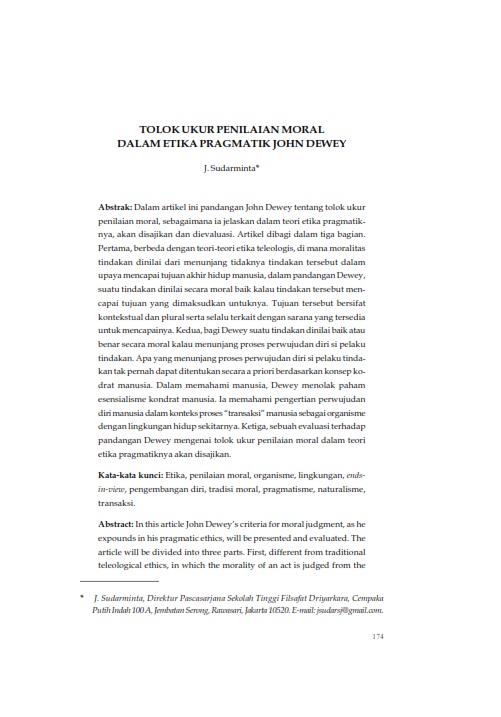Tolok Ukur Penilaian Moral Dalam Etika Pragmatik John Dewey
Abstract
Abstrak: Dalam artikel ini pandangan John Dewey tentang tolok ukur penilaian moral, sebagaimana ia jelaskan dalam teori etika pragmatiknya, akan disajikan dan dievaluasi. Artikel dibagi dalam tiga bagian. Pertama, berbeda dengan teori-teori etika teleologis, di mana moralitas tindakan dinilai dari menunjang tidaknya tindakan tersebut dalam upaya mencapai tujuan akhir hidup manusia, dalam pandangan Dewey, suatu tindakan dinilai secara moral baik kalau tindakan tersebut mencapai tujuan yang dimaksudkan untuknya. Tujuan tersebut bersifat kontekstual dan plural serta selalu terkait dengan sarana yang tersedia untuk mencapainya. Kedua, bagi Dewey suatu tindakan dinilai baik atau benar secara moral kalau menunjang proses perwujudan diri si pelaku tindakan. Apa yang menunjang proses perwujudan diri si pelaku tindakan tak pernah dapat ditentukan secara a priori berdasarkan konsep kodrat manusia. Dalam memahami manusia, Dewey menolak paham esensialisme kondrat manusia. Ia memahami pengertian perwujudan diri manusia dalam konteks proses ‘transaksi’ manusia sebagai organisme dengan lingkungan hidup sekitarnya. Ketiga, sebuah evaluasi terhadap pandangan Dewey mengenai tolok ukur penilaian moral dalam teori etika pragmatiknya akan disajikan.
Katakunci: etika, penilaian moral, organisme, lingkungan, ends-in-view, pengembangan diri, tradisi moral, pragmatisme, naturalisme, transaksi.
Abstract: In this article John Dewey’s criteria for moral judgment, as he expounds in his pragmatic ethics, will be presented and evaluated. The article will be divided into three parts. First, different from traditional teleological ethics, in which the morality of an act is judged from the point of view of certain human final end, an act, in Dewey’s view, should be judged as morally good if it achieves its specific and contextual end-in-view. There are many ends-in-view as there are many moral acts, and an end-in-view can never be determined apart from its actually available means to achieve it. Second, for Dewey, an act is considered good or morally right if it does in practice lead to the human self-realization of the agent. What constitutes an agent’s human self-realization can never be determined in a priori way. Dewey rejects essentialism of human nature in understanding human being. He understands human self-realization within the context human dynamic process of “transactions” with his or her concrete environment. Third, an evaluation of Dewey’s view will be provided.
Keywords: ethics, moral judgment, organism, environment, ends-in-view, self-realization, moral tradition, pragmatism, naturalism, transaction.

DISKURSUS applies the Creative Commons license (CC BY). We allow readers to read, download, copy, distribute, print, search, or link to the full texts of its articles and allow readers to use them for any other lawful purpose. The author must be aware that the article copyrights will be fully transferred to DISKURSUS if the article is accepted to be published in the journal. Once the manuscript has been published, authors are allowed to use their published article under DISKURSUS copyrights. Full information about CC BY can be found here: https://creativecommons.org/licenses/by/4.0/












